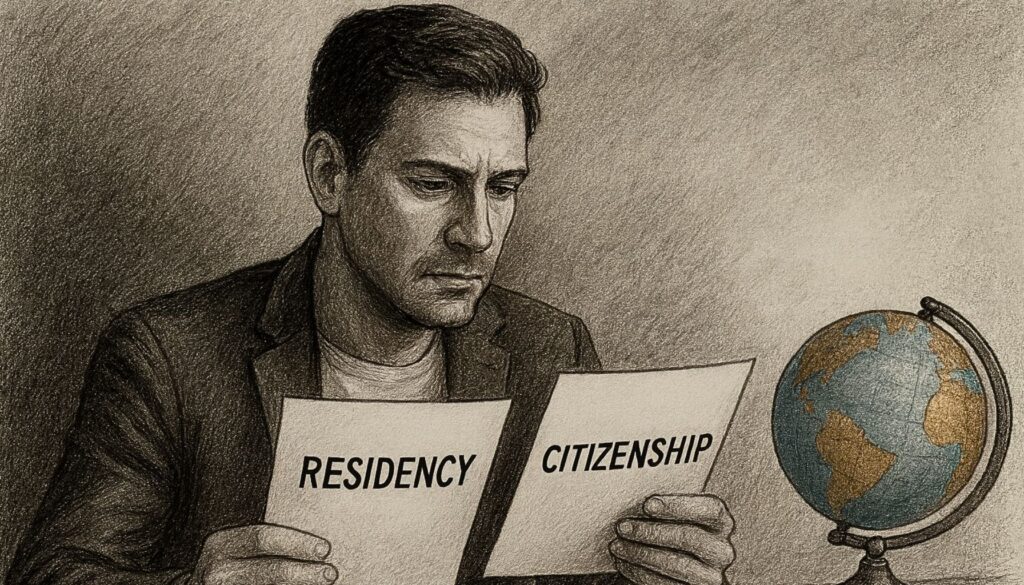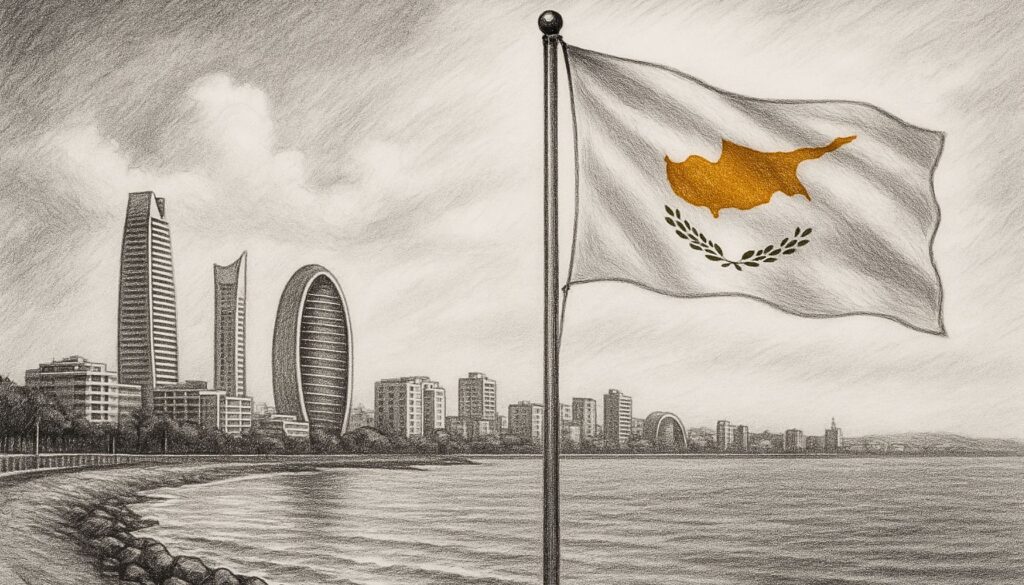The European Union, the OECD, and their allies have declared war on the best tax-free countries in 2025.
They want to eliminate any jurisdiction that reminds them of their own failure. It bothers them that there are still countries where businesses pay less tax, where you can live without being fiscally hunted, and where financial privacy is still respected.
But this isn’t just about millionaires. It’s about you—whether you work, build, invest, or simply want to escape tax suffocation.
Because in 2025, it’s no longer enough to ask in which countries you don’t pay taxes. The real question is: Who will survive the next wave of global regulation?
While you’re busy building a freer life plan, they’re preparing to dismantle it. They’re targeting the countries with lower taxes in Europe and the countries with lower taxes in Latin America, pushing for reforms, blacklisting them, and restricting their systems.
And they do it for one reason only: If you can choose where to live and pay less… the system loses power.
That’s why in this blog, we’ll show you which are the best tax-free countries in 2025, what risks they face, and how to structure a legal, intelligent, and antifragile strategy—while there are still jurisdictions offering real freedom.

Indice del artículo
Why do they want to eliminate the best tax-free countries in 2025?
The European Union, the OECD, and the FATF. Are no longer hiding their intentions: they want to dismantle any model that contradicts their fiscal dogma. And the best tax-free countries in 2025 have become their newest target.
They are uncomfortable with the countries with lower taxes in Europe, which prove that it’s possible to grow without crushing citizens under a mountain of taxes. They can’t tolerate that there are still the countries with lower taxes in Latin America, where businesses thrive without being drained, and where living doesn’t mean handing over your fiscal soul to the State (without your consent).
Why such interest in shutting these models down?
Because if there are places in which countries you don’t pay taxes on foreign income, or countries where businesses pay less tax, taxpayers, capital, young entrepreneurs, investors, and even digital workers will choose to live there. Where effort is respected. And that’s exactly what they can’t allow.
“It’s not about legality. It’s about control.”
The OECD is already openly pressuring countries like Panama, Paraguay, or Georgia to dismantle their territorial taxation systems—even if they comply with international standards and participate in information exchange. The issue isn’t that they hide anything—it’s that they offer an alternative.
From Europe, the narrative is clear: if you choose to live in a country where you pay less tax, you’re attacking the European solidarity model. Even if you contribute, even if you’re legal, even if you create jobs.
How to build an antifragile ecosystem in 2025: Tactical Residencies, Strategic Nationalities, and Financial Privacy
When the best tax-free countries in 2025 are under crossfire, simply choosing a good tax residency is no longer enough. Real freedom today is built through an interconnected system—one that protects you if a jurisdiction collapses, backs you if a government changes the rules, and allows you to move your life freely, without asking for permission. Because in a world where it’s no longer obvious in which countries you don’t pay taxes, strategy is the only thing that guarantees sovereignty.
Nomad, this ecosystem is not improvised—it’s designed with strategy. And it stands on three essential pillars that go hand in hand with paying less tax:
- Strategic nationalities
- Tactical residencies in pragmatic jurisdictions
- Financial privacy
Countries with Strategic Nationalities in 2025
Some of the countries that offer strategic nationalities also rank among the best tax-free countries in 2025. El Salvador is one of them, combining fiscal sovereignty with access to a future-oriented citizenship.
Argentina, on the other hand—although it’s a hidden gem in the world of second nationalities—has a high internal tax burden. Still, its passport remains valuable as a legal tool with geopolitical weight.
Meanwhile, Turkey and St. Kitts and Nevis offer speed and simplicity in exchange for an investment, ideal for those who prioritize immediate results in their international planning.
El Salvador and Argentina: Countries with Strategic Nationalities
El Salvador: political sovereignty and a forward-thinking nationality
Beyond its crypto-fiscal appeal, El Salvador is gaining ground as an emerging strategic nationality.
- It allows citizenship by naturalization after 5 years of legal residency—or after just 1 year through marriage, adoption, or ancestry. If you are Spanish or of Latin American origin, 1 year of residency is enough to naturalize.
- You’re not required to renounce your original nationality.
- Its Latin American passport offers regional free movement and diplomatic relations with the U.S., Asia, and Europe.
- It is not listed among highly taxed or EU-sanctioned countries.
But its most important asset in 2025? Its independent geopolitical stance.
While other countries align their migration and tax policies with Brussels or the OECD, El Salvador stands as a sovereign jurisdiction, with no consular pressure on its expatriate citizens.
Argentina: a second nationality without giving up anything
While Argentina is not one of the best tax-free countries in 2025—due to one of the most complex and burdensome tax systems in the region—its true value lies in its role as a legal and identity protection tool.
- You can obtain citizenship by naturalization after just two years of continuous legal residency, with no investment required.
- It allows dual citizenship with no restrictions.
- Its passport offers strong mobility in both the Americas and Europe: visa-free or visa-on-arrival access to 172 countries.
- It comes with low consular pressure—many Argentinians live abroad with minimal interference from the State.
Who is it for?
For those seeking an alternative nationality without spending $100,000, based on solid legal grounds, without giving up their current citizenship, and with real, practical use.
Turkey and St. Kitts and Nevis: Countries That Let You Naturalize Through Investment
Turkey: fast-track citizenship with strength and no renunciation
Turkey is not one of the best tax-free countries in 2025, but it has become one of the strongest options for obtaining a second nationality through investment. It combines a fast process with a passport offering broad international mobility. For those already living in countries where businesses pay less tax, Turkish citizenship acts as a legal shield against sudden regulatory changes.
Minimum investment:
- USD 400,000 in real estate, with a commitment to hold the property for at least 3 years.
- Alternatively, USD 500,000 in bank deposits, government bonds, or investment funds, also with a 3-year holding period.
Fast-track process:
- Citizenship is typically granted within 4 to 6 months after submitting the application.
Key advantages:
- No need to renounce your original citizenship.
- No residence or language requirements.
- Access to a solid banking system and a country with growing geopolitical influence.
Who is Turkey for?
For those seeking a second nationality that is quick and uncomplicated, with a passport that grants visa-free or visa-on-arrival access to over 110 countries. Ideal for anyone wanting to diversify their legal identity in a country not under constant international scrutiny.
St. Kitts and Nevis: the most established and reliable Caribbean citizenship
St. Kitts and Nevis offers the oldest citizenship-by-investment program in the world, established in 1984. It remains an attractive option for those looking for a second nationality with tangible benefits. Combined with a base in countries where businesses pay less tax, this passport becomes a key piece of the antifragile strategy.
Investment options:
- A non-refundable donation of USD 250,000 to the Sustainable Island State Contribution (SISC) for a primary applicant and up to three dependents.
- Government-approved real estate investment of at least USD 325,000, held for a minimum of 7 years.
Notable benefits:
- Lifetime citizenship that can be passed on to future generations.
- No physical residency or travel to the country required.
- Passport with visa-free access to over 150 countries, including the Schengen Area, the UK, and Hong Kong.
- Favorable tax system: no income, inheritance, or capital gains tax.
Who is St. Kitts and Nevis for?
For those seeking a second nationality that is discreet, effective, and backed by a clear process in a jurisdiction that values financial privacy and individual sovereignty.

In which countries you don’t pay taxes? Tactical residencies in pragmatic jurisdictions
There’s a reason why certain countries end up in the global spotlight: they allow ordinary people, entrepreneurs, and companies to operate freely. Because once people know in which countries you don’t pay taxes, it shakes the very foundation of the dominant fiscal narrative.
The pressure doesn’t just fall on so-called “tax havens.” It also targets jurisdictions that apply legitimate models like the territorial tax system—one that doesn’t fit Brussels’ playbook, nor that of its allies, who want a homogenized tax framework… even if that means crushing any system that actually works.
And yes: the best tax-free countries in 2025 are under direct fire.
The countries with lower taxes in Europe in 2025
The countries below are on the radar—and not for their beaches or architecture. They’re being watched because they represent a working alternative to the dominant tax-grab model.
Cyprus: increasingly under the spotlight
Cyprus remains one of the countries with lower taxes in Europe, but that doesn’t mean it’s off the radar. Quite the opposite. In 2025, its popularity as a legal tax haven has placed it right at the eye of the storm.
- Legal tax residency with just 60 days per year.
- 17-year exemption on dividends, interest, and passive income under the Non-Dom regime.
- 0% tax on inheritance and donations.
- Only 2.65% contribution to the public health system (GESY) and a corporate tax rate of 12.5%, still highly competitive under OECD standards.
The issue?
Brussels has already expressed its “concern” over these schemes, and although Cyprus complies with CRS and FATF standards, its very existence is inconvenient for those pushing for full fiscal harmonization across Europe.
Georgia: tax efficiency with a European horizon
Georgia has long been an attractive destination for freelancers, digital entrepreneurs, and small investors thanks to its favorable tax system and accessible business environment. In 2025, the country maintains several key incentives:
- Limited territorial taxation: foreign-sourced income is not taxed unless repatriated.
- Deferred corporate tax: companies pay 15% only on distributed profits, allowing reinvestment without immediate tax burden.
- Microbusiness regime: individual entrepreneurs earning under 500,000 GEL (approx. $185,000 USD in 2025) can qualify as “small businesses” and pay just 1% on gross revenue.
- Accessible tax residency: easy to obtain and compatible with international structures.
- No exit tax or capital controls: enabling financial mobility and asset planning.
However, Georgia seeks closer ties with the European Union, which means aligning with stricter transparency and fiscal standards.
The countries with lower taxes in Latin America in 2025
Although Europe often dominates the conversation around competitive tax destinations, Latin America also hosts some of the best tax-free countries in 2025, with legitimate models now facing growing international pressure.
Paraguay: a legal oasis that still respects producers
Paraguay continues to do something revolutionary: it doesn’t punish productivity. Its territorial tax system remains fully intact in 2025, which means if your income is earned abroad, you pay zero local taxes. For digital nomads invoicing internationally, that’s the difference between peace of mind and fiscal anxiety.
But this isn’t just a one-off benefit. Paraguay enjoys macroeconomic stability, low inflation, and projected growth of 3.8% this year. While other countries multiply regulations and tax burdens, here you can still breathe fiscal predictability—a rare asset in 2025. The country doesn’t penalize value creation; it encourages and protects it.
Looking to launch a business or set up an international structure? Paraguay has the answer. Incentive schemes, duty-free importation of machinery, low operational costs, and flexibility.
The Maquila Law allows Paraguay to be one of the countries where businesses pay less tax, with just a 1% levy on the locally added value. In a world that’s closing in on fiscal freedom, Paraguay still offers room, margin—and time. But Europe’s radar is always spinning. The sooner you move, the stronger your position.
El Salvador: fiscal sovereignty and 0% on crypto
El Salvador was the first country to adopt Bitcoin as legal tender back in 2021. However, under IMF pressure, the country repealed Bitcoin’s legal status in 2025—though it continues to allow crypto as a valid payment method.
Still, El Salvador retains its territorial tax system, meaning foreign income is exempt. And gains from buying and selling Bitcoin or other digital assets remain tax-free, enhancing investment profitability.
What does this mean? El Salvador remains one of the countries with lower taxes in Latin America and a strong destination for crypto investors and traders seeking to maximize profits in a tax-friendly environment. That said, staying up to date with regulatory shifts is essential.
Uruguay: a viable hybrid model?
Uruguay offers a balanced approach for those seeking fiscal and legal stability. New tax residents can opt into the Non-Resident Income Tax (IRNR) during their residency year and the ten following years. This allows for exemptions on certain types of income not subject to that tax.
Additionally, Uruguay has extended its tax holiday for new residents, providing long-term fiscal benefits to those relocating their tax base.
What to consider? Uruguay is a solid option for those who value predictability and long-term incentives. It’s a viable choice among countries where businesses pay less tax, but it requires proper planning and compliance to benefit legally and sustainably.
Panama: territorial taxation still standing
Panama remains one of the few countries where territorial taxation is more than a concept—it’s actual law. If your income is earned outside the country, you don’t pay local tax on it. And in 2025, that still makes a difference.
In recent years, Panama has implemented key reforms: it adopted CRS, participates in automatic financial information exchange, and updated its legal framework to meet international standards. Despite external pressure, Panama hasn’t lost its strategic appeal for those who know how to structure smartly:
- In the Colón Free Zone, companies enjoy income and dividend tax exemptions for export activities.
- The SEM regime grants fiscal and migratory benefits to multinational companies setting up regional offices.
- Tax residency can be obtained through clear requirements like presence or economic ties, without excessive bureaucracy or barriers.
Is Panama for everyone? No. But if you’re considering an operational base outside the EU, it remains a viable jurisdiction for well-structured businesses.

Countries where businesses pay less tax in 2025 — and still protect financial privacy
In a world where every tax return is scanned by artificial intelligence and fiscal surveillance grows by the day, there are still countries where businesses pay less tax without falling into illegality or secrecy. These are jurisdictions that understand that attracting capital, innovation, and talent is more profitable than chasing it away.
United Arab Emirates: control, yes — but without persecution
In 2025, the United Arab Emirates maintains its position as one of the countries with the lowest corporate tax burden. Although a 9% corporate tax was introduced on profits exceeding 375,000 AED (about USD 100,000), the reality is that most free zones still offer 0% taxation, provided operations are properly structured.
There are no taxes on dividends, capital gains, wealth, or inheritance. This makes the UAE not only fiscally attractive, but one of the few countries where you can operate transparently—without hiding structures or entering gray areas.
The best part? Unlike Europe, where tax innovation is punished, the UAE rewards it. While the EU pushes for preventive fiscal surveillance, the Emirates protect compliant taxpayers, without automatic suspicion or default blacklisting.
Bulgaria: the overlooked gem
When we talk about the countries with lower taxes in Europe, Bulgaria rarely comes up. While the spotlight shines on Cyprus or Malta, Bulgaria quietly offers one of the most straightforward and appealing packages for those who want to optimize their structure without playing hide and seek:
- 10% flat personal income tax.
- 10% corporate income tax — simple and with no fine print.
- Only 5% tax on dividends.
- No exit tax or wealth tax.
Obtaining tax residency is simple: stay more than 183 days per year or demonstrate clear personal and economic ties to the country.
Bulgaria doesn’t chase foreign capital. It doesn’t demand explanations, heroic tax compliance, or interfere with what you earn abroad. The result? An EU member country that hasn’t lost its fiscal sanity.
As with all countries where businesses pay less tax, the main risk is not internal—but external. If EU pressure increases, Bulgaria may eventually be pushed to “align” with the region’s more aggressive tax models.

The best tax-free countries aren’t improvised. They’re structured.
In 2025, continuing to ask in which countries you don’t pay taxes without a real plan is naïve.
The best tax-free countries in 2025 are under attack, and only those who build an ecosystem of tactical residencies, strategic nationalities, and financial privacy will preserve their sovereignty.
👉 If you want to protect your wealth, mobility, and future — don’t wait for the doors to close.
Book your consultation and let’s design your antifragile structure together.



